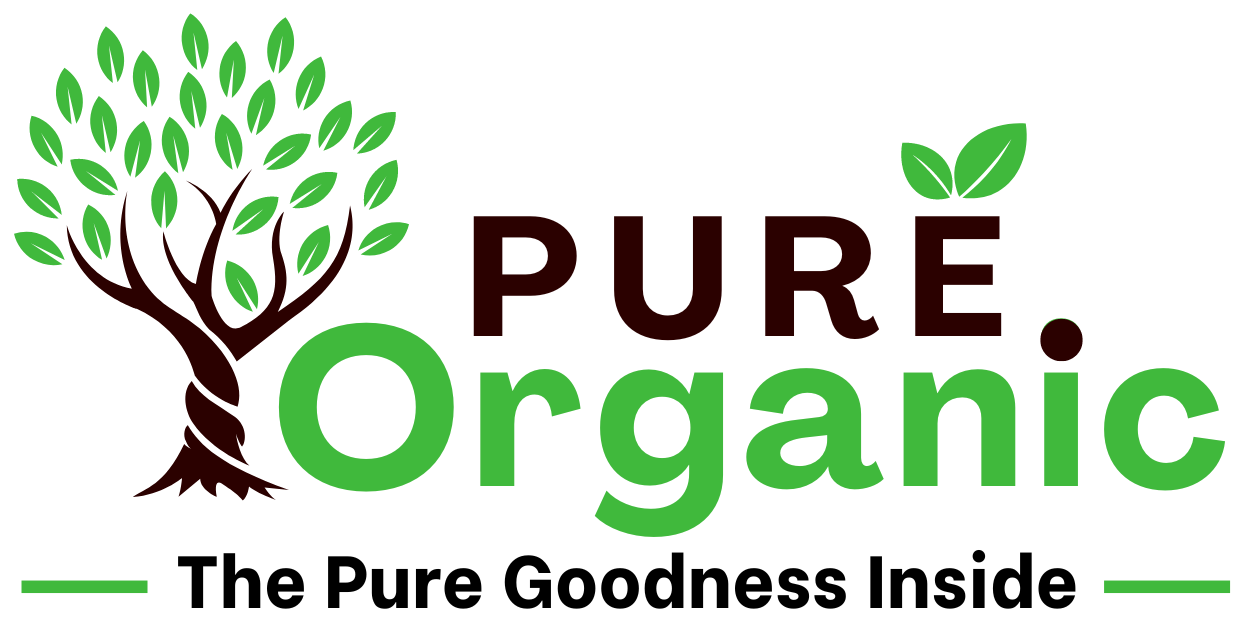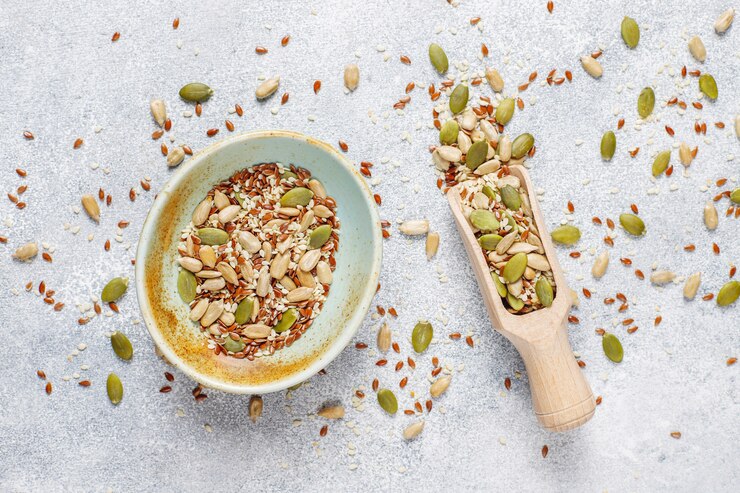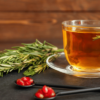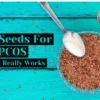Balancing hormones is no easy feat, especially when dealing with irregular cycles, PCOS, fertility challenges, or symptoms like mood swings and fatigue. With so many synthetic options available, finding a natural and effective solution can feel like searching for a needle in a haystack. Enter Seed Cycling, a simple, food-based practice that aligns with your menstrual cycle to support hormonal harmony.
But does it really work? Let’s dive into the science, benefits, and real-life experiences of seed cycling and show how it can transform your hormonal health. By the end, you’ll understand why our Seed Cycling Kit is the perfect partner for your wellness journey.
What is Seed Cycling?
Seed cycling is a natural wellness practice where you consume specific seeds during different phases of your menstrual cycle. The goal is to leverage the unique nutrient profiles of seeds to promote hormonal balance, regulate cycles, and support overall reproductive health.
The Phases of Seed Cycling:
- Follicular Phase (Days 1–14):
- Seeds: Flax seeds and pumpkin seeds
- Purpose: Support estrogen production, improve ovulation, and detoxify excess hormones.
- Timing: Start from the first day of your period until ovulation.
- Luteal Phase (Days 15–28):
- Seeds: Sesame seeds and sunflower seeds
- Purpose: Boost progesterone production, reduce inflammation, and stabilize mood.
- Timing: From ovulation until the start of your next period.
This cyclical approach aligns with the natural hormonal fluctuations in your body, creating a rhythm that promotes balance and wellness.
How Does Seed Cycling Work?
Nutritional Power of the Seeds
Each seed in the cycle has specific nutrients that interact with your hormones:
- Flax Seeds:
Contain lignans, a type of phytoestrogen, which help modulate estrogen levels. Flax seeds also provide omega-3 fatty acids, reducing inflammation and promoting healthy cell function. - Pumpkin Seeds:
Rich in zinc, pumpkin seeds support healthy ovulation by improving follicle development and reducing PMS symptoms. - Sesame Seeds:
High in zinc and selenium, sesame seeds enhance progesterone levels and help detoxify excess estrogen during the luteal phase. - Sunflower Seeds:
Packed with vitamin E and selenium, sunflower seeds protect cells from oxidative stress, reduce inflammation, and improve hormone production.
By rotating these seeds during your menstrual cycle, you provide your body with targeted nutrients at the right time, optimizing hormonal health.
What Does Science Say?
Although direct clinical studies on seed cycling are limited, research on the individual seeds highlights their potential benefits:
- Flax Seeds and Estrogen Regulation:
Studies show that flax seeds can improve estrogen metabolism, which is crucial for managing conditions like PCOS and endometriosis. A 2013 study published in The Journal of Nutrition found that flax lignans help balance estrogen levels in women. - Pumpkin Seeds and Zinc:
Zinc has been linked to improved ovulation, reduced PMS symptoms, and enhanced fertility. It’s also essential for regulating the immune system and reducing inflammation, which can impact hormonal balance. - Sesame and Sunflower Seeds:
Research supports the role of sesame seeds in enhancing progesterone production, while selenium in sunflower seeds promotes liver detoxification—a key factor in processing hormones efficiently.
Benefits of Seed Cycling
Seed cycling offers a range of benefits for women in different life stages:
1. Balances Hormones Naturally
Hormonal imbalances can cause symptoms like irregular periods, acne, mood swings, and low energy. By supporting estrogen and progesterone production, seed cycling helps restore equilibrium.
2. Reduces PMS and Menstrual Discomfort
The anti-inflammatory properties of the seeds ease symptoms like bloating, cramps, and mood swings. Many women report less pain and a lighter flow after consistent seed cycling.
3. Improves Fertility
Seed cycling supports reproductive health by enhancing ovulation, regulating cycles, and creating a favorable hormonal environment for conception.
4. Supports PCOS Management
For women with PCOS, seed cycling can reduce symptoms like irregular periods, excess androgen levels, and insulin resistance by promoting healthy hormone levels.
5. Post-Menopause Support
Even without a menstrual cycle, seed cycling can help balance hormones, reduce hot flashes, and improve bone health during menopause.
Real Stories of Success
Women around the world are embracing seed cycling, and their stories are inspiring:
“I’ve struggled with irregular cycles for years, but seed cycling helped me get back on track. After three months, my periods are regular, and my PMS is barely noticeable.” – Nadia R.
“Seed cycling was a game-changer for my PCOS. It’s amazing how something so simple made such a big difference in my energy levels and mood.” – Zainab K.
Why Our Seed Cycling Kit is Your Perfect Partner
Consistency is key in seed cycling, but sourcing fresh, high-quality seeds and preparing them can be a hassle. That’s why we created the Pure Organic Seed Cycling Kit — a simple, effective solution to make your journey easy and enjoyable.
What’s Inside the Kit?
- Pre-portioned organic seeds for each phase.
- Fresh seeds to maximize nutrient absorption.
Why Customers Love It:
- Convenience: No need to buy, measure, or grind seeds yourself.
- Freshness: Sealed for optimal flavor and nutritional value.
- Quality: 100% organic, non-GMO, and chemical-free.
How to Start Your Seed Cycling Journey
- Order Your Kit: Get your hands on the Pure Organic Seed Cycling Kit today.
- Follow the Instructions: Add the pre-portioned seeds to smoothies, oatmeal, or salads daily.
- Stay Consistent: Give your body 2–3 months to fully respond to the benefits of seed cycling.
FAQs About Seed Cycling
Can seed cycling help with PCOS?
Yes! Seed cycling is particularly beneficial for women with PCOS. By supporting hormone balance and reducing excess estrogen, it can help regulate cycles, improve ovulation, and alleviate symptoms like acne, hair thinning, and weight fluctuations.
Can I practice seed cycling if I have irregular or no periods?
Absolutely. If your cycles are irregular or absent, you can use the lunar calendar as a guide. Start the follicular phase (flax and pumpkin seeds) on the new moon and switch to the luteal phase (sesame and sunflower seeds) on the full moon.
Is seed cycling effective for women in menopause?
Yes. While menopause brings hormonal changes, seed cycling can help balance estrogen and progesterone levels, reducing symptoms like hot flashes, mood swings, and fatigue.
Can men benefit from seed cycling?
Seed cycling isn’t just for women! Men can also benefit from the nutrients in these seeds, as they support prostate health, hormone regulation, and overall wellness.
How long should I continue seed cycling?
Seed cycling can be a long-term practice. Most women notice benefits within 2–3 months, but for lasting results, consistency is key. You can make it a permanent part of your wellness routine.
How do I incorporate seeds into my diet?
You can sprinkle seeds on oatmeal, yogurt, salads, or soups. They’re also great in smoothies, energy balls, or as a topping for avocado toast. The possibilities are endless!
Is seed cycling a replacement for medication or supplements?
Seed cycling is a complementary, natural approach to hormonal health. If you’re on medication or supplements, consult your healthcare provider before making changes to your routine.
Are there any side effects to seed cycling?
Seed cycling is generally safe, but some individuals may experience mild bloating or digestive discomfort, especially if they’re not used to eating high-fiber foods. Start with smaller amounts if needed and drink plenty of water.
Can I use seed cycling if I’m trying to conceive?
Yes! Seed cycling is highly supportive of fertility. By regulating hormones and supporting ovulation, it creates an optimal environment for conception.
Can I skip a few days in seed cycling?
Consistency is important, but missing a day or two won’t derail your progress. Just resume the appropriate seeds for your current phase.
Do I need to take other supplements alongside seed cycling?
Seed cycling provides many essential nutrients, but you can complement it with a healthy diet rich in whole foods. If you have specific deficiencies, talk to your healthcare provider about additional supplementation.







12 thoughts on “Does Seed Cycling Actually Work?”
Pingback: buy cheap xifaxan generic online buy
Pingback: Buy rifaximin tablets without a perscription
Pingback: buy cheap UK avodart
Pingback: buy staxyn generic available in united states
Pingback: buy cheap itraconazole cheap canada pharmacy
Pingback: buying gabapentin generic from canadian pharmacy
Pingback: cheap fildena online no rx
Pingback: get dutasteride purchase online from india
Pingback: online order flexeril cyclobenzaprine buy singapore
Pingback: No perscription androxal fedex delivery
Pingback: kamagra pas cher pas de rx requis canada
Pingback: online order enclomiphene generic does it works
You must be logged in to post a comment.